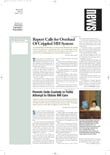Remember Elvis Presley’s song “Heartbreak Hotel”? The results of a new study on vacation heart attacks suggest that “Heartbreak Tent” or “Heartbreak Mobile Home” might be a more appropriate title.
The study has found that traveling by car to one’s vacation destination and staying in a tent or mobile home during vacation are risk factors for a vacation heart attack.
Heart attacks have been known to be the leading cause of death during vacation. Yet the factors that can lead to a heart attack during vacation have been unknown. So researchers decided to launch a study in hopes of identifying some of those factors. The investigators were Willem Kop, Ph.D., of the Uniformed Services University of the Health Sciences in Bethesda, Md.; Ad Vingerhoets, Ph.D., a psychologist with Tilburg University in the Netherlands; Gert-Jan Kruithof, M.D., of the Royal Dutch Touring Club in the Netherlands; and John Gottdiener, M.D., of St. Francis Hospital in Roslyn, N.Y.
First they recruited, via the Royal Dutch Touring Club, 92 subjects who had had heart attacks during vacation as well as 67 age-matched controls who had had medical emergencies other than heart attacks during vacation.
To establish whether risk factors for heart attacks during vacation are specific for vacations per se and do not merely reflect risk factors for heart attacks in general, they also included a second control group—30 subjects who had had heart attacks in areas where they lived and who reported characteristics of their latest vacation before the heart attack.
Next, Kop and his colleagues compared the 92 subjects who had vacation heart attacks with the 67 controls who had had other types of vacation medical emergencies to see whether they could pinpoint factors peculiar to the former group.
They could, they found. The former group was significantly more likely to have a prior diagnosis of coronary artery disease and standard cardiovascular risk factors (male gender, hypertension, and a family history for cardiovascular disease) than controls were.
After that, Kop and his team compared the vacation heart attack subjects with the subjects who had had their heart attacks at home and who described their most recent vacation before the attack. The former were more likely to have traveled to their vacation destination by car and to have stayed in a tent or mobile home during vacation. These differences were statistically significant.
And even when Kop and his coworkers took age, socioeconomic status, a history of coronary artery disease, and a family history of cardiovascular disease into consideration, traveling to one’s vacation destination by car and staying in a tent or mobile home during vacation remained predictive of a vacation heart attack.
So putting all these findings together, the researchers concluded in the May/June Psychosomatic Medicine, “Driving by car to the vacation destination and staying in a tent or mobile home may increase the risk of a heart attack among high-risk individuals. These circumstances of vacation travel and accommodation may pose physical and mental burdens that could act as triggers of a heart attack during vacation, particularly among individuals with a high vulnerability for cardiovascular events.”
The study was supported in part by a National Institutes of Health grant.
An abstract of the study, “Risk Factors for Myocardial Infarction During Vacation Travel,” is posted on the Web at www.psychosomaticmedicine.org/cgi/content/abstract/65/3/396. ▪
Psychosom Med 2003 65 396
